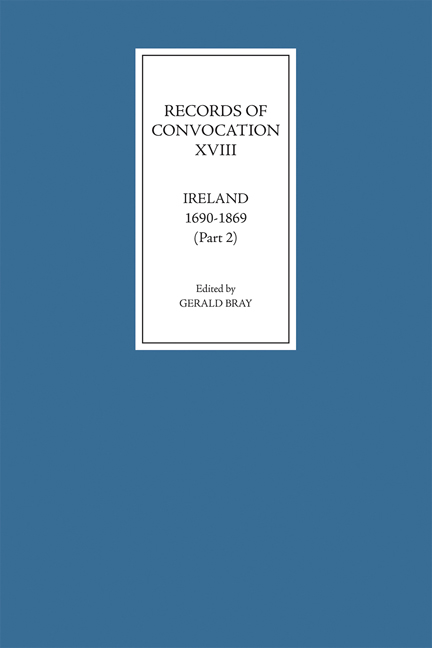Book contents
- Frontmatter
- Content
- Abbreviations
- Anne (1702-14)
- George I (1714-27)
- George II (1727-60)
- George III (1760-1820)
- George IV (1820-30)
- William IV (1830-7)
- Victoria (1837-1901)
- A table of proportions to be paid by the archbishops and bishops
- Prolocutors of the Irish national convocation, 1615-1869
- Membership of the convocation of the Church of Ireland
- Irish bishops in the house of lords, 1801-70
- The Nova Taxatio of Pope Nicholas IV in Ireland
- The Province of Armagh
- The Province of Cashel
- The Province of Dublin
- The Province of Tuam
- The Valor in Hibernia
- Irish clerical taxation
- Guide to source material
- The Irish convocation controversy, 1708-11
- Index of sources
- Index of references
- Index of names and places
- Index of subjects
- Bibliography
George II (1727-60)
Published online by Cambridge University Press: 11 January 2024
- Frontmatter
- Content
- Abbreviations
- Anne (1702-14)
- George I (1714-27)
- George II (1727-60)
- George III (1760-1820)
- George IV (1820-30)
- William IV (1830-7)
- Victoria (1837-1901)
- A table of proportions to be paid by the archbishops and bishops
- Prolocutors of the Irish national convocation, 1615-1869
- Membership of the convocation of the Church of Ireland
- Irish bishops in the house of lords, 1801-70
- The Nova Taxatio of Pope Nicholas IV in Ireland
- The Province of Armagh
- The Province of Cashel
- The Province of Dublin
- The Province of Tuam
- The Valor in Hibernia
- Irish clerical taxation
- Guide to source material
- The Irish convocation controversy, 1708-11
- Index of sources
- Index of references
- Index of names and places
- Index of subjects
- Bibliography
Summary
Parliament
Archbishop Hugh Boulter of Armagh to the archbishop of Canterbury
[13 January 1728]
I find by my lord lieutenant the ministry are not desirous that a convocation should sit here; nor do I desire it, except they had some useful business to do, and I was thoroughly certain they would confine themselves to that. I have had no great occasion or leisure to enquire into the nature of our convocation here, but as it is made up of the clergy of four provinces, I find some of our bench question whether they have ever been settled in such a regular method of being called as to make a truly legal assembly.
Front Jonathan Swift, Considerations upon two bills (24 February 1732)3S6
An act of parliament for settling or selling an estate in a private family is never passed until all parties give consent. But in the present case the whole body of the clergy is, as themselves apprehend, determined to utter ruin, without once expecting or asking their opinion; and this by a scheme contrived only by one part of the convocation, while the other part, which has been chosen in the usual forms, wants only the regal permission to assemble and consult about the affairs of the church, as their predecessors have always done in former ages; where it is presumed, the lower house has a power of proposing canons and a negative voice as well as the upper. And God forbid (say these objectors) that there should be a real separate interest between the bishops and clergy, any more than there is between a man and his wife, a king and his people or Christ and his church.
- Type
- Chapter
- Information
- Records of Convocation , pp. 189 - 192Publisher: Boydell & BrewerFirst published in: 2024

